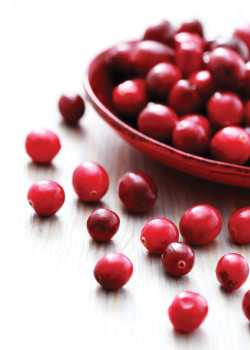Cranberries
This article was originally published in December 2015

Cranberries are one of the highest sources of antioxidants per serving, right up there with blueberries, chocolate and pomegranates.
They contain vitamin C (20% daily value) and vitamin E (10% DV) as well as quercetin, procyanidins and resveratrol — the antioxidant found in red wine.
While these crimson jewels are well known for fighting urinary tract infections (UTIs), they also can protect our heart, teeth, stomach and intestines, and a growing body of research is exploring the anticancer potential of cranberries.
Fresh cranberries are available in the Northwest during November and December and will keep in the fridge for up to two months. But you also can reap the benefits of frozen, juiced and dried forms year-round. Because of their tart, sour taste, cranberries most often are sweetened, but you will find unsweetened frozen cranberries at PCC from Stahlbush Island Farms. They’re great for smoothies and hot breakfast cereal!
Fresh vs. supplements
Cranberry supplements can be useful for getting concentrated levels of cranberries’ many antioxidants without the tart cranberry flavor or the added sugars that often accompany cranberry-rich foods. Supplements will not offer the pectin (fiber), and high doses are not recommended if you have a history of kidney stones or take blood-thinning medications.
While supplements have their place, food sources probably are the best form for maximizing all of the health benefits that cranberries offer. The American Institute for Cancer Research reports that while the antioxidants found in cranberries fight cancer cells individually, they “seem to work synergistically, providing more protection together rather than individually.”
FUN FACT: Fresh cranberries should bounce when dropped on the floor or counter; as a result, cranberries sometimes are called bounce berries.
4 ways cranberries help protect our bodies
Oral
Cranberries often are sweetened to make them palatable, but cranberry extract is found in dental products such as mouthwash, toothpaste and dental floss. The antioxidants in cranberries help prevent bacteria from sticking to your teeth, reducing plaque formations and helping to prevent gum disease. You’ll find Radius Cranberry Floss at PCC.
Heart
Cranberries’ many antioxidants can support heart health by reducing inflammation, normalizing blood pressure, and preventing oxidative damage. The pectin in cranberries can help lower blood cholesterol.
Digestive
When you cook down fresh cranberries, they quickly thicken as a result of their pectin content. Pectin is a soluble fiber that supports digestive health and increases satiety. Cranberries have beneficial prebiotic effects too, increasing the number of good bacteria in our GI tract and fighting the bacteria (h. pylori) that cause stomach ulcers.
Urinary
Cranberries help prevent recurrent urinary tract infections because of their high concentration of procyanidins — antioxidants that block bacteria from grabbing onto the wall of the urinary tract.
